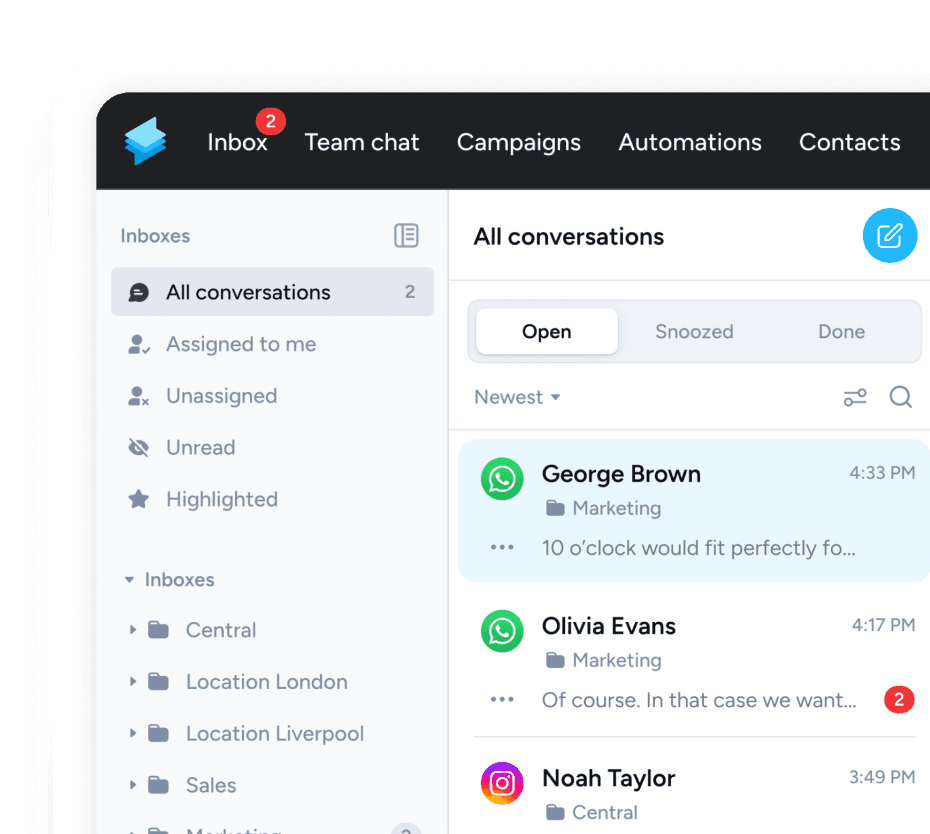Most businesses respond little or not at all to online reviews. But actively managing your reviews can have a huge impact on your potential new customers. By following a few best practices, you can maximise the impact of positive reviews and minimise the impact of negative ones.
Review management best practices:
- Try to respond as quickly as possible
- Respond to all reviews, both negative and positive
- Always thank customers for their review, even if you don't agree with the content
- Try to keep discussions out of the public eye by moving them to a private conversation.
- Use negative reviews to find areas for improvement and positive reviews to find USPs.
In this article, you'll learn
- Why responding to reviews is so important
- Why you should reply to all your reviews
- How to deal with negative reviews
- Common review response mistakes and best practices
Why responding to reviews is so important
More than 90% of people rely on online reviews. For many, especially younger customers, online reviews are as important as a personal recommendation from a friend.
This means that reviews - authentic experiences from real users - can make or break a business. Most business owners have already realised this, but are often unsure of how to deal with reviews.
One of the most important things to understand is, that customers not only read other customers' experiences, but they also pay attention to how you respond to them.
By responding to reviews proactively and thoughtfully, you can negate the impact of negative reviews and amplify the positive ones. The quantity and quality of reviews also has a significant impact on search engine and review platform rankings, especially for local businesses.
Why you should reply to all your reviews
Responding to your reviews can have many positive effects. For example, studies have shown that there is a correlation between responding to reviews and your Google rankings. In short, the more reviews you respond to, the higher you will rank on Google.
Don't forget that when you reply to a review, Google and most other review platforms also notify the reviewer. So it's also a great way to engage with your customers and deepen your relationship with them. Surveys show that your customers also expect you to respond to reviews - ideally within 24 hours.
By responding to every review, you also show your potential customers that you care deeply about customer service and are open to a constructive exchange. This leaves a positive first impression with your potential customers and strengthens your image and brand. And your current review management is also likely to have an impact on future reviews: A Harvard Business School study found that consistently responding to reviews can improve your overall rating in the long run.
How to deal with negative reviews
A negative review can leave founders feeling angry and upset - especially if they feel it is unjustified. Many business owners go into a state of shock, wondering whether they should even respond to the criticism. Especially if you feel you don't have the time or resources to deal with review management. But not responding to a bad review at all is the worst possible option.
Potential customers are looking for your service or product online. If they see in the Google reviews that you don't generally respond to negative reviews, it's a deterrent. They may conclude that you either do not take your customers' criticism seriously or that it is justified. In the worst case, this can lead to potential customers turning to your competitor.
Don't forget that online reviews are your virtual shop window. Search engines such as Google have become one of the most important sources of new business for most entrepreneurs. So don't be afraid of negative reviews and show your customers and potential customers that you are investing in giving them a good experience.
Looking to improve your review management. Check out our guide 👉 Online Reputation Management - Answer, Improve & Manage Customer Reviews
Responding to negative reviews
No matter how good your service or product, negative reviews are part of running a business. It is impossible to please every customer. If you're just starting to respond to all the ratings, it's best to start with the negative ones. The sooner you respond to negative feedback, the sooner you may be able to resolve the issue. It will also reduce the amount of time potential customers have to see your unanswered negative reviews.
Don’t take reviews personally
The first and most important step is to try not to take negative reviews personally. This also means: Never respond to a review in a state of anger or frustration. If you are going to reply to the review yourself, wait until you've calmed down. Take a deep breath and wait a few hours or even the next day before replying.
Always apologize for a negative experience
Always start by thanking the customer for taking the time to give you feedback and apologise for the negative experience, even if you feel it's unjustified. Negative feedback is an opportunity to improve your product or service.
Offer your customer a quick and easy solution to their problem. If this works, you can always ask them to change or even delete their review later.
Thanking a customer for their review, even a negative one, shows other potential customers, that it’s important to you to deliver an overall good experience, even if you already made your sale.
Take the discussion private
Never start a public discussion; it is best to move the solution to a private chat. If you know who the customer is, and you have some contact information, try to reach them in private to find a solution and fix their problem.
If you don’t, provide them with a contact information in your reply, asking them to contact you directly to help you understand the issue better and find a solution.
Your customers' opinions matter. Superchat can help you set up a simple process to generate new online reviews and build trust with your target audience. Try our 👉 Reputation Management Solution
Common mistakes when managing reviews
Proactive review management is key to maintaining a good online reputation. The worst thing you can do is not respond to reviews at all, but that doesn't mean you should rush headlong into it. Here are five common mistakes to avoid when responding to reviews.
Responding to reviews too late
The worst thing you can do is not respond to reviews, but responding too late could be a close second. Surveys show, that customers typically expect a business to respond within 24 hours. Especially if they have given you a negative review, they expect their problem to be resolved quickly.
Don't make managing your reviews a once-a-year exercise. Set aside time on a regular basis, at least weekly, to respond to open reviews.
Check your profiles regularly for new reviews and decide whether they require your immediate attention, such as a customer complaint, or whether they can be dealt with later.
Getting into a public debate with disgruntled customers
A serious mistake that many entrepreneurs make at least once at the beginning: never start an online debate! You can quickly lose control of a ping-pong discussion. In the worst case, other online users will get involved, which can lead to a real shitstorm.
If possible, offer them a quick solution to their problem or ask them to contact you. If you know who the customer is, try to contact them and resolve the issue. Negative reviews are often posted in a moment of frustration rather than reflecting a real overall dissatisfaction.
Denying your own mistakes and blaming customers
Is your customer fundamentally wrong because there is nothing wrong with your service or customer care? Not a good attitude. Failing to recognize you own mistake and apologising for a bad customer experience, or even blaming the customer is not a good strategy. Especially if you want to keep the customer.
Is your customer fundamentally wrong because there is nothing wrong with your service or customer care? Not a good attitude. Failing to acknowledge your mistake and apologising for a bad customer experience, or even blaming the customer, is not a good strategy. Especially if you want to keep the customer
Even if the problem is not really your fault, you should not publicly accuse a customer of misbehaving. You will only exacerbate the conflict. You will only be adding fuel to the fire, making your customer even more angry and poisoning your relationship in the long run.
Deleting negative reviews
The urge to remove a negative review is an understandable impulse. Some business owners are quick to try and delete a critical review. But in many cases, this can make things worse and give the impression that you can't handle criticism.
On most platforms, it is not easy to get unpleasant reviews deleted. Businesses usually have to prove that the review is not based on an actual customer experience, and may even need to hire a lawyer.
Business owners should also not underestimate the impact that turning a negative review into a positive experience can have on both existing and potential customers.
Buying positive reviews
Do you have a lot of negative reviews and want to balance them out with positive ones? A good idea in itself. But not if you plan to just buy them. Online users are now aware that reviews can be bought and will usually spot a fake review if it is overwhelmingly positive. What is more, if you buy reviews illegally, you are actually committing a criminal offence.
Conclusion
Responding to reviews is one of the most important, yet often overlooked, tasks in successful online reputation management. While not responding to reviews is definitely the worst kind of review management, there are some best practices that companies should follow. The most important of these are responding to reviews in a timely manner, not engaging in emotional public discussions, and demonstrating a general interest in providing a positive overall experience.

